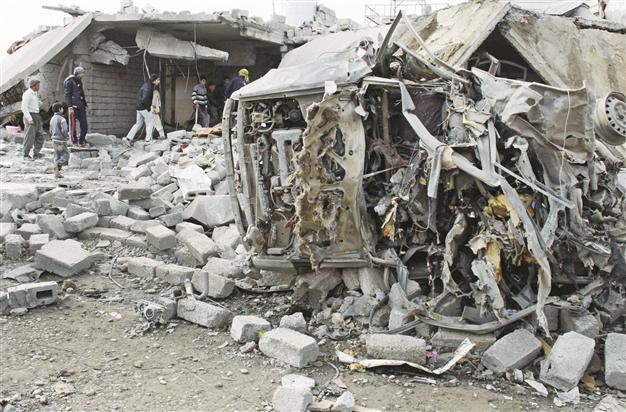Attacks rock Iraq after Baghdad-Arbil accord
BAGHDAD / KONYA

People inspect the scene of a car bomb attack in al-Mouafaqiyah, a village inhabited by families from the Shabak ethnic group, near the city of Mosul. Yesterday was the deadliest day in Iraq since Nov. 29. AP photo
A wave of attacks targeting both Iraqi security forces and civilians killed 48 people yesterday, in a second day of deadly violence soon after Baghdad and the Kurdish government in northern Iraq said they agreed to remove forces from disputed areas.
Yesterday was the deadliest day in Iraq since Nov. 29, when 50 people were killed, and the latest violence comes after attacks killed 19 people and wounded 77 on Dec. 16, Agence France-Presse reported. Gunmen yesterday attacked a police checkpoint on the highway west of Tikrit, then abandoned and detonated their explosive-rigged car when a patrol pursued them, killing a total of five police officers and wounding five, a senior police officer and a doctor said. In the village of al-Buslaibi, north of Baghdad, a roadside bomb targeting an army patrol killed three soldiers, while an attack by gunmen on an army checkpoint in the northern city of Mosul killed one soldier.
A car bomb in Khaznah, near Mosul killed seven people and wounded 12, while two car bombs near a Shiite place of worship killed five and wounded 26 in the northern town of Tuz Khurmatu. Three roadside bombs exploded near Baquba, north of Baghdad, killing one person and wounding four others, while a magnetic “sticky bomb” and a shooting in the city killed two people. Khaznah, Tuz Khurmatu and Jalawla are all part of areas which the Kurdistan Regional Government wants to incorporate, over Baghdad’s strong objections. Baghdad and Arbil reached an agreement last week to remove their troops from these disputed regions.
FM thanks efforts on calming tension
“The attacks in the disputed internal areas further aggravate the tensions there,” U.N. Iraq envoy Martin Kobler said in a statement condemning the violence.
A roadside bomb against a police patrol in Madain, south of Baghdad, wounded three police officers and two civilians, while an attack by gunmen on a Sahwa anti-al-Qaeda militia checkpoint west of the northern Iraqi city of Kirkuk killed one militiaman.
Meanwhile, Turkish Foreign Minister Ahmet Davutoğlu has said Iraq’s religious leaders had made increased efforts to fight sectarian conflicts in the country. “All Iraqi religious leaders, and especially [Grand] Ayatollah Ali al-Sistani, heads of Sunni and Shiite waqfs [endowments] as well as Christian religious leaders have exerted intense efforts to fight against circles that tried to foment sectarian conflicts in Iraq,” he said in a meeting yesterday with a group of Iraqi officials from Kirkuk, religious leaders as well as an Afghan local governor, who were in the Turkish province of Konya to attend a ceremony to commemorate Mevlana Celaddiin-i Rumi, founder of Islam’s Mevlevi order. “God willing, with their efforts this menace of divisions will never prevail in the region,” Davutoğlu said.
